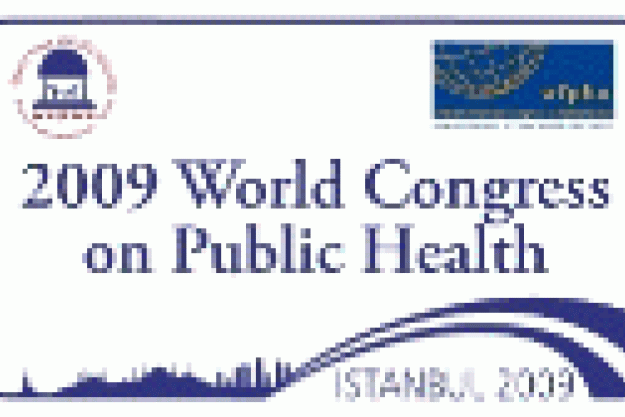
2009 World Congress on Public Health logo
The OPCW Director-General, Ambassador Rogelio Pfirter, addressed a plenary session of the 12th World Congress of Public Health Associations, which is being held in Istanbul, Turkey from 27 April to 1 May 2009 and organised by the World Federation of Public Health Associations. The topic of his presentation was “The OPCW and Public Health,” which the Director-General also discussed in a parallel session.
In his remarks to the plenary, Director-General Pfirter stressed the importance of understanding the implications for public health both from the possible use of weapons of mass destruction as well as from programmes to destroy them, and how the work of agencies in the sphere of disarmament and non-proliferation intersects with public health. He noted that in implementing the Chemical Weapons Convention the OPCW has pioneered the incorporation of health and safety activities into its programmes, including the destruction of chemical weapons stockpiles.
The Director-General highlighted that in every case, high standards of health and safety have been maintained in these destruction efforts and serious accidents have been avoided, which he called a tribute to the determination of possessor States to comply with their obligations in the most conscientious way possible. He suggested that one aspect which could be strengthened in this area is community outreach, saying the activities and safeguards at destruction facilities should be clearly explained to local leaders and opinion makers and that regular communication be maintained with them in the course of the destruction activities.
The Director-General informed the plenary that the OPCW also organises regular trainings in detection, protection and decontamination to strengthen the capacity of States Parties for assistance and protection against chemical weapons. He suggested that these training activities would benefit from greater involvement of health experts, particularly in developing greater capacity to recognize the signs and symptoms of chemical weapons.
Director-General Pfirter said the OPCW has played an important role in helping to develop a global knowledge base in preparedness, noting that its Health and Safety Branch prepared the chapters on chemical weapons for the latest version of WHO’s Guidance on Public Health Response to Biological and Chemical Weapons, published in 2004. He also noted that the OPCW participated with WHO and the IAEA in a comparative study completed in 2005 which assessed national public health preparedness for weapons of mass destruction, and which concluded that the most cost-effective way to improve response systems is to raise awareness and educate medical personnel.
To this end, the Director-General said the OPCW conducts week-long training courses on detection, protection and decontamination which were developed based on lessons learned from events in recent decades such as the Bhopal disaster in India, the Iran-Iraq war, the Tokyo subway attack, and 9/11. In addition, he noted that the OPCW has provided financial assistance and technical expertise for an annual training course in medical defence against chemical weapons held in each of the last nine years in Tehran.
